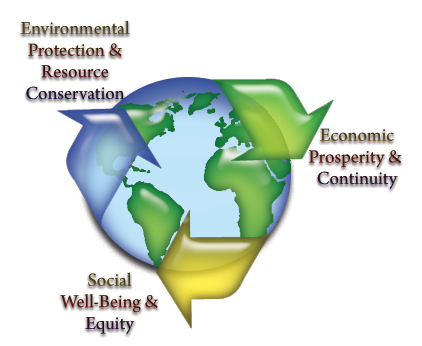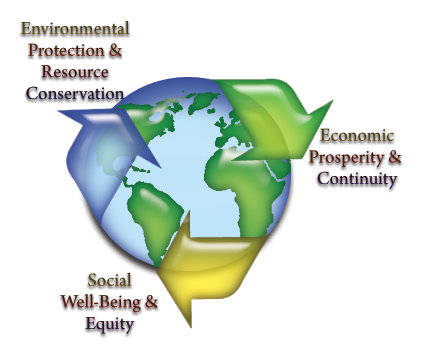“The California Student Sustainability Coalition is a non-profit organization that supports and connects students from across California to help them transform their educational institutions into models of sustainability” – the CSSC website.
But what does “sustainability” mean? Lately, it’s become a media buzzword, yet another drop in the greenwash bucket. As students, we have the power to redefine how our society thinks about sustainability. The CSSC is committed to recognizing and working toward the “Three E’s” of sustainability: economy, ecology, and equity. Unlike conventional notions of sustainability that are linked to environmentalism and dwell only in the ecology sector, this three-pronged approach takes into account the fact that all three “e’s” are interconnected.

There is no ecological sustainability without equity. There is no economic sustainability without sound ecology. In fact, the words “economy” and “ecology” come from the same root - “oikos” or “ecos,” the Greek word for “household.” We all inhabit the same household that we call earth.
What does that mean on the ground? CSSC chapters across the state work on issues that relate to all three sustainability sectors. CSSC students are working toward a more just society for all – equitably, ecologically, and economically. I asked our Council Reps to write back with examples of how their chapters are addressing the 3 E’s. Here are some responses:
Equity and Ecology: “Last year, my campus (Claremont McKenna College) tried to include equity into its environmental goals. At our parties, there was not only the issue that students weren’t recycling their disposable red cups, but they were also not even picking up after themselves. They would leave all the work to the grounds/maintenance staff, which definitely wasn’t fair to them. It also cost the school extra money to clean up. So, as a work in progress, we have painted trash cans red to look like an actual red party cup, in an attempt to encourage students to pick up after themselves and recycle. We also hooked this into a general recycling initiative on campus. This effort is ongoing, but an important issue on campus that we continue to address.” - Hannah Haskell, Claremont McKenna College Council Rep
Ecology: “The [Glendale Community College] Environmental Club went to Bakersfield, California to help “Wind Wolves Preserve” restore the native salt bush habitat by planting seeds and building a fence to protect them from cattle.” - Monica Tecson, GCC Council Rep
Equity, Ecology, and Economy: A campaign by Cal Poly Fair Trade Club is aimed at contracting CAN Coffee on campus, and CAN Coffee is a fair-trade coffee (economy and equity). The coffee is grown using the concept of agroecology, which is the understanding that the production of coffee has to be developed within an agricultural system, without disturbing the system (ecology). - Eb McKibben, Cal Poly SLO Council Rep
Economy and ecology: “At [UC Santa Barbara], the Environmental Affairs Board tackles a bunch of different projects. One that has proved to be successful is the “Carrot Mob.” It follows the proverb that says it is easier getting a horse to water by leading it with a carrot rather than thumping it with a stick. We went to various businesses to “green” them by getting them to have more efficient lighting or other appliances, etc. We told them that we would hold a “carrot mob” there, which would attract a lot of customers. By going to the business that day, customers knew they were supporting a good cause. So the store was willing to do it because it increased their customer base for the day. This was all with the agreement that they would match dollar for dollar what they earned that day and invest it in more efficient energies. This would definitely be the economy side!” - Emily Wililams, UCSB Council Rep
Fighting for sustainability means addressing income inequality and poverty. It means preserving forests but also preserving the communities that live off the forest. It means ending all types of discrimination. It means ending corporate personhood. It means addressing climate change but not at the expense of people who are already exploited and impoverished. It means clean energy but also equitable energy, real food but also equitable access to food. It means getting young people out to vote. It means empowering students to be agents of justice of all kinds on their campuses and beyond.
Martin Luther King famously stated, “Injustice anywhere is a threat to justice everywhere. We are caught in an inescapable network of mutuality, tied in a single garment of destiny.”
Have an idea of how the CSSC can better represent all three “E’s”? Post a comment here, or email me at [email protected].


Pingback: Content Hydra | How Parks Gentrify Neighborhoods, And How To Stop It
Pingback: Where Did the Green Media Go? | covering sustainability
Pingback: How can the digital signage industry impact sustainability efforts? | Aqwastream™